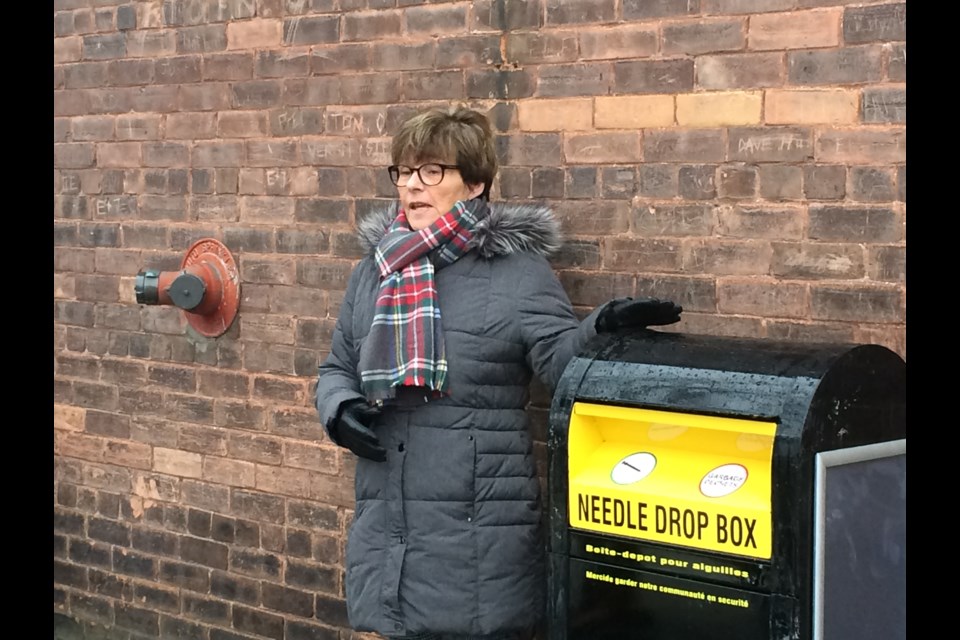The installation of a community sharps bin in Sturgeon Falls has been a collaborative effort among community stakeholders dating back to last August.
On Friday morning, those same stakeholders gathered for the launch of the initiative at the area’s first sharps bin, located at the corner of Main Street and Queen Street.
The idea is to curtail the improper disposal of sharps whether it be in public places, in the garbage or recycling, by providing a safe alternative.
The Mayor of West Nipissing Joanne Savage feels it is a step in the right direction.
“West Nipissing is not exempt from issues with addiction and mental health. When I heard comments from local citizens that they are finding needles at different locations, that is when I reached out to the local health unit and asked what support mechanisms or strategies or solutions they could provide,” said Savage.
Following a meeting with various stakeholders and with the endorsement of municipal council, the decision was made to have the bin installed in the downtown area.
“I still have residents that are saying people won’t be using it, but if it makes a difference in saving even one life, it saves one life. When we look at strategies or solutions to be able to make sure our community is safe, I am a firm believer that it is not only going to be one initiative, it is going to be a multitude of initiatives. We have to work with our community partners that have the expertise and can identify solutions to make our community safer,” Savage said.
As executive director of clinical services and chief nursing officer with the North Bay Parry Sound District Health Unit, Cathy Menzies-Boule said one of the challenges with needle exchange programs is the safe disposal of needles.
Menzies-Boule says the benefits to having a sharps bin are numerous.
“It is going to take needles off the street and provide a safe place for people to dispose of needles. It will prevent needle stick injuries and probably most importantly, it will help to prevent the transmission of infectious agents such as Hepatitis B, Hepatitis C and HIV.”
Educating people about the importance of using the bin continues to be a work in progress.
“The partners who have worked on this have developed informational posters and pamphlets and worked with folks who use substance. So those who have lived experience can now share the word among their peers. And then also working with community partners who work with clientele, they will be spreading the word as well.”
The public health unit is currently involved in on-going conversations with other municipalities about doing something similar in their community.
“This is an approach that is well researched. It is based on evidence and has been successful in other communities, so hopefully our ongoing communication with other municipalities will result in this as well,” said Menzies-Boule.
“There is an evaluative component to it, so we will be looking at how successful it is and then we will be able to use that to improve services here and elsewhere.”
Michael Taylor is the adult substance abuse councillor at the West Nipissing General Hospital Alliance Centre.
“We’ve done some math with some of our needle exchange stats, and we see we are right on par with North Bay, “ said Taylor.
“We want to address it like it is a public health issue and inject the same empathy and compassion that we would for any other disorder.”
Taylor stressed the importance of reducing the stigma around addiction.
“If people can’t seem to change that behaviour, at least we can keep them safe while they are doing that.”
